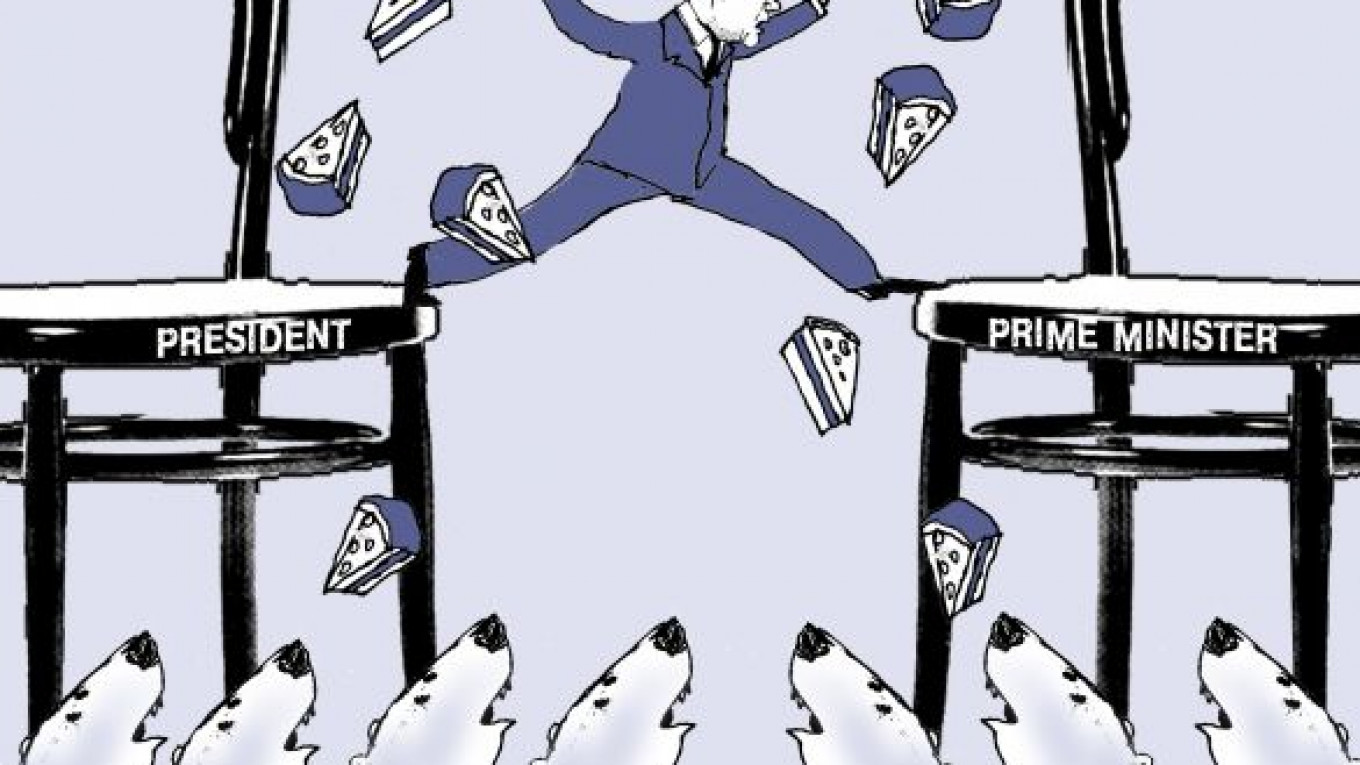It would be wrong to conclude that President Dmitry Medvedev can expect to have the prime minister spot in 2012 simply handed to him on a silver platter as payment for his past services and loyalty. In fact, the outgoing president is working hard to earn that post.
In the past two weeks alone, Medvedev has chaired a session of the State Council presidium in Khabarovsk that discussed an increased role for the regions in modernizing the economy, a meeting with media representatives of the Far East, also in Khabarovsk, as well as a visiting session of the public committee made up of supporters and regional members of United Russia and held in Yakutsk.
The United Russia gathering was the most recent of three virtually identical such meetings, each held in different locations. The meeting with journalists was announced as the first in a series of such gatherings to be held this month. The main idea Medvedev conveyed was that Russia had already achieved a great deal in its modernization drive and would accomplish much more through innovative economic development and by reducing the country’s dependence on raw materials and improving its political institutions.
And finally, the membership of the State Council presidium is approaching that of the expanded State Council. This is a type of enticement, as well as a means by which the regional political elite can demonstrate their loyalty and effectiveness to the Moscow leadership prior to the Dec. 4 State Duma elections.
At all of these meetings, Medvedev comes across as neither a president nor a prime minister. When Prime Minister Vladimir Putin chaired minicongresses for United Russia, he allocated government funding and made concrete promises, whereas Medvedev’s role has been to paint a positive picture of things and to act as the “moral engine of development,” as he so elegantly puts it. The perks Medvedev hands out cost little and are mostly symbolic in nature — for example, promising to give pensioners and students from the Far East free annual trips to the European part of Russia, something Putin promised several years ago.
Medvedev’s words to governors, who have been acting as regional lobbyists during the election campaign, would serve as a fitting epigraph to the discussion of modernization. The president said, “Russia is a country in which it is impossible to get by without large-scale projects that serve as an engine of development.”
It is arguable whether they are “engines of development,” but it is undeniable that such projects as Nord Stream, the Sochi Olympic Games and the plans for a so-called “Greater Moscow” provide a mechanism by which Putin can funnel the country’s oil and gas revenues into the bank accounts of his oligarch friends. Similarly, the plan to develop tourism in the North Caucasus is a way for the Moscow leadership to buy the loyalty of local political elites and their friends.
This practice became the hallmark of the
Putin-Medvedev term. Choice morsels were given out to satisfy the growing appetites of Putin’s loyal business elite, such as energy trader Gennady Timchenko, Arkady and Boris Rotenberg and Rossiya Bank director Yury Kovalchuk. These so-called “black oligarchs,” whose prosperity depends on their close ties to the Kremlin, have gained considerable strength since 2008.
Meanwhile, the same period was marked by setbacks for the old-school “white oligarchs,” owners of major internationally recognized firms. They did receive a major injection of funds from the state during the crisis, but they paid for it with a considerable loss of control over their assets.
During Medvedev’s meeting with governors from Russia’s eastern region — a meeting that was essentially a presidium of the State Council — a number of other major and extremely costly projects were mentioned: a high-speed railway from Moscow to Yekaterinburg, a third line in the Trans-Siberian Railroad, a bridge to Sakhalin Island and others.
No oligarchs have vested interests in many of these pork-barrel projects, apparently making them “people’s programs” to be exploited by the regional political elite. And, as everyone knows, those projects are not designed to be carried out, but to create the impression that everyone’s proposals have been heard and taken seriously. What is amazing is the way that these projects costing billions of dollars materialize out of thin air just before elections to satisfy the growing appetites of the political and economic elite.
Throwing money recklessly at these big-ticket projects also has the effect of reducing the conflict between political clans, which observers had predicted would result from a struggle over limited resources — all the more so since the money is promised at the regional, not the federal level.
What is important is that Medvedev — whether in his former capacity as deputy prime minister when he headed national projects from 2006 to 2008, or as president — has spent years as a sort of PR director operating within the limited authority given him.
And nothing has changed now that he is the top candidate for prime minister. His role remains the same in this political system dominated by a single individual. His job title might change, but he essentially remains a cheerleader for projects undertaken by “Russia, Inc.” headed by Putin.
Nikolai Petrov is a scholar in residence at the Carnegie Moscow Center.
A Message from The Moscow Times:
Dear readers,
We are facing unprecedented challenges. Russia's Prosecutor General's Office has designated The Moscow Times as an "undesirable" organization, criminalizing our work and putting our staff at risk of prosecution. This follows our earlier unjust labeling as a "foreign agent."
These actions are direct attempts to silence independent journalism in Russia. The authorities claim our work "discredits the decisions of the Russian leadership." We see things differently: we strive to provide accurate, unbiased reporting on Russia.
We, the journalists of The Moscow Times, refuse to be silenced. But to continue our work, we need your help.
Your support, no matter how small, makes a world of difference. If you can, please support us monthly starting from just $2. It's quick to set up, and every contribution makes a significant impact.
By supporting The Moscow Times, you're defending open, independent journalism in the face of repression. Thank you for standing with us.
Remind me later.







